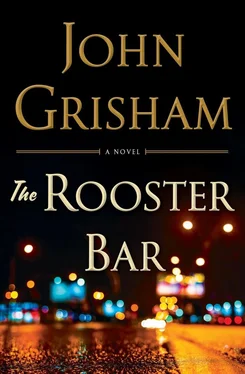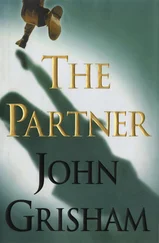“We’ll survive, Gordy,” Mark said, but without conviction.
“We’ll get through it,” Todd said, without specifying which “it” he was referring to. Law school? The debt? Unemployment? Or Gordy’s breakdown? There were so many challenges at the moment.
Another long, dreary pause. Mark and Todd quietly sipped their beers.
Gordy said, “How can we expose Rackley? I’ve thought about sitting down with a reporter, someone who covers the legal beat for the Post or maybe the Journal . I’ve even thought about a class action lawsuit against the crook. Think of the thousands of young idiots like us who are on the same sinking ship and would love to take a shot at the guy once the truth is out.”
Mark said, “I don’t see a lawsuit. I mean, sure, he’s put together a brilliant scheme but he hasn’t done anything that’s actionable. There’s no law against owning diploma mills, even though he’s trying his best to hide it. His law firms can hire whoever they want. Sleazy, unfair, deceitful, but not enough for a lawsuit.”
“Agreed,” Todd said. “But I love the idea of helping an investigative reporter hammer the guy.”
Zola asked, “Wasn’t there a case in California where a law student sued her law school because she couldn’t find a job?”
Mark replied, “Yes, there have been several, all dismissed but for the one in California. It went to trial and the jury found in favor of the law school.”
Gordy said, “I’m not giving up on the lawsuit. It’s the best way to expose Rackley. Can you imagine what discovery would be like?”
“All fun and games, but he’s not stupid,” Mark said. “Hell, he owns four law firms. Just think of the heavy artillery he’d throw at you. The plaintiffs would spend the next five years drowning in paperwork.”
“What do you know about lawsuits?” Gordy asked.
“Everything. I’ve been educated at Foggy Bottom.”
“I rest my case.”
The lame effort at humor passed and they stared at the floor. Finally, Todd said, “Come on, Gordy, let’s go get a pizza.”
“I’m not going anywhere but I think you guys should leave.”
“Then we’re not leaving either,” Mark said. “We’re staying here.”
“Why? I don’t need a babysitter. Get out.”
Todd, still standing, walked to the sofa and stared down at Gordy. “Let’s talk about you, Gordy, you and your condition. You’re not sleeping or eating, or bathing for that matter. Are you taking your meds?”
“What meds?”
“Come on, Gordy. We’re your friends and we’re here to help.”
“What meds?” he demanded.
“Come on, Gordy, we know what’s going on,” Mark said.
Gordy turned to Zola and growled, “What have you told them?”
Zola was about to respond when Todd said, “Nothing. She’s told us nothing, but we’re not blind, Gordy, we’re your best friends and you need some help.”
“I don’t need meds,” he snapped back, then bolted to his feet, brushed by Todd, and went to his bedroom. Seconds later he yelled, “Get out of here!” and slammed the door. They took a deep breath and stared at each other. Seconds later, the door opened and Gordy came out. He grabbed the bottle of tequila, said, “Leave! Now!” and disappeared again into his bedroom.
A minute passed without a sound. Zola stood and crossed the den. She put an ear to his door and listened. She stepped away and whispered, “I think he’s crying.”
“Great,” Mark whispered.
Another minute passed. Softly, Todd said, “We can’t leave him.”
“No way,” Mark said. “Let’s take turns. I’ll pull the first shift on the sofa.”
“I’m not leaving,” Zola said.
Mark looked around the den and finished his beer. Almost in a whisper he said, “Okay, you take the sofa and I’ll take the chair. Todd, you sleep on Zola’s sofa and we’ll swap in a few hours.”
Todd nodded and said, “Okay, I guess that will work.” He stepped to the fridge, got another beer, and left. Mark turned off the lights and settled into the battered leather chair. A few feet away, Zola curled up on the sofa. He whispered, “This could be a long night.”
“We shouldn’t talk,” she said. “The walls are thin and he might hear us.”
“Right.”
The digital clock on the microwave emitted a bluish light that seemed to grow brighter as their eyes adjusted to the darkness. It defined the shadows of the small dining table, the computer, and printer. Though they were still wide awake, the room was perfectly still. No sounds from the bedroom. Soft, distant music from down the hall. After ten minutes, Mark pulled out his phone and checked his messages and e-mails. Nothing important. The next ten minutes seemed like an hour as the chair grew more uncomfortable.
He stared at the wall. He couldn’t see the picture of Hinds Rackley, but he could feel his eyes gazing smugly down at them. At the moment, though, Mark wasn’t concerned with Rackley and his grand conspiracy. He was worried about Gordy. Their challenge tomorrow would be getting their friend to the doctor.
At 2:00 a.m., Todd slipped into Gordy’s apartment without a sound and found both Mark and Zola asleep. He shook Mark’s arm and whispered, “My turn.” Mark stood, stretched his stiff joints and muscles, and walked across the hall, where he fell onto Zola’s sofa.
Before dawn, Gordy got out of bed and put on his jeans, sweatshirt, socks, and denim jacket. Holding his hiking boots, he stood by the door and listened. He knew they were in the den, waiting for him to make a move. He gently opened the bedroom door and listened. He took a step into the den, saw their silhouettes on the sofa and in the chair, heard their heavy breathing, and silently walked to the door. At the end of the hallway, he put on his boots and left the building.
At the first hint of sunlight, Zola awoke and sat up. Seeing the bedroom door open she jumped to her feet, turned on the lights, and realized Gordy had managed to escape. “He’s not here!” she yelled at Todd. “He’s gone!”
Todd scrambled out of the chair and walked past her to the bedroom, a small square space where hiding would be impossible. He poked through the closet, looked in the bathroom, and yelled, “Shit! What happened?”
“He got up and left,” she said. They stared at each other in disbelief, then walked over to break the news to Mark. The three hurried down the stairs and along the first-floor hallway to the building’s rear door. There were a dozen cars in the parking lot but none of them belonged to Gordy. His little Mazda was gone, as they feared it would be. Zola called Gordy’s cell but of course there was no answer. They returned to the apartments, locked the doors, and walked three blocks to a diner where they huddled in a booth and tried to regroup over black coffee.
“There’s no way to find him in this city,” Mark said.
“He doesn’t want to be found,” Todd said.
“Should we call the police?” Zola asked.
“And tell them what? Our friend’s missing and might hurt himself? These cops are busy with last night’s murders and rapes.”
Todd asked, “What about his parents? They probably have no idea what shape he’s in.”
Mark was shaking his head. “No, Gordy would hate us forever. Besides, what can they do? Hurry over to the big city and start searching?”
“I agree, but Gordy has a doctor somewhere, either here or back home. A doctor who knows him, who’s treated him, who’s prescribed the meds, someone who should know that he’s in bad shape. If we tell his parents, they can at least inform the doctor. Who cares if we piss off Gordy as long as he gets some help?”
“That makes sense,” Zola said. “And the doctor is here. Gordy sees him once a month.”
Читать дальше












